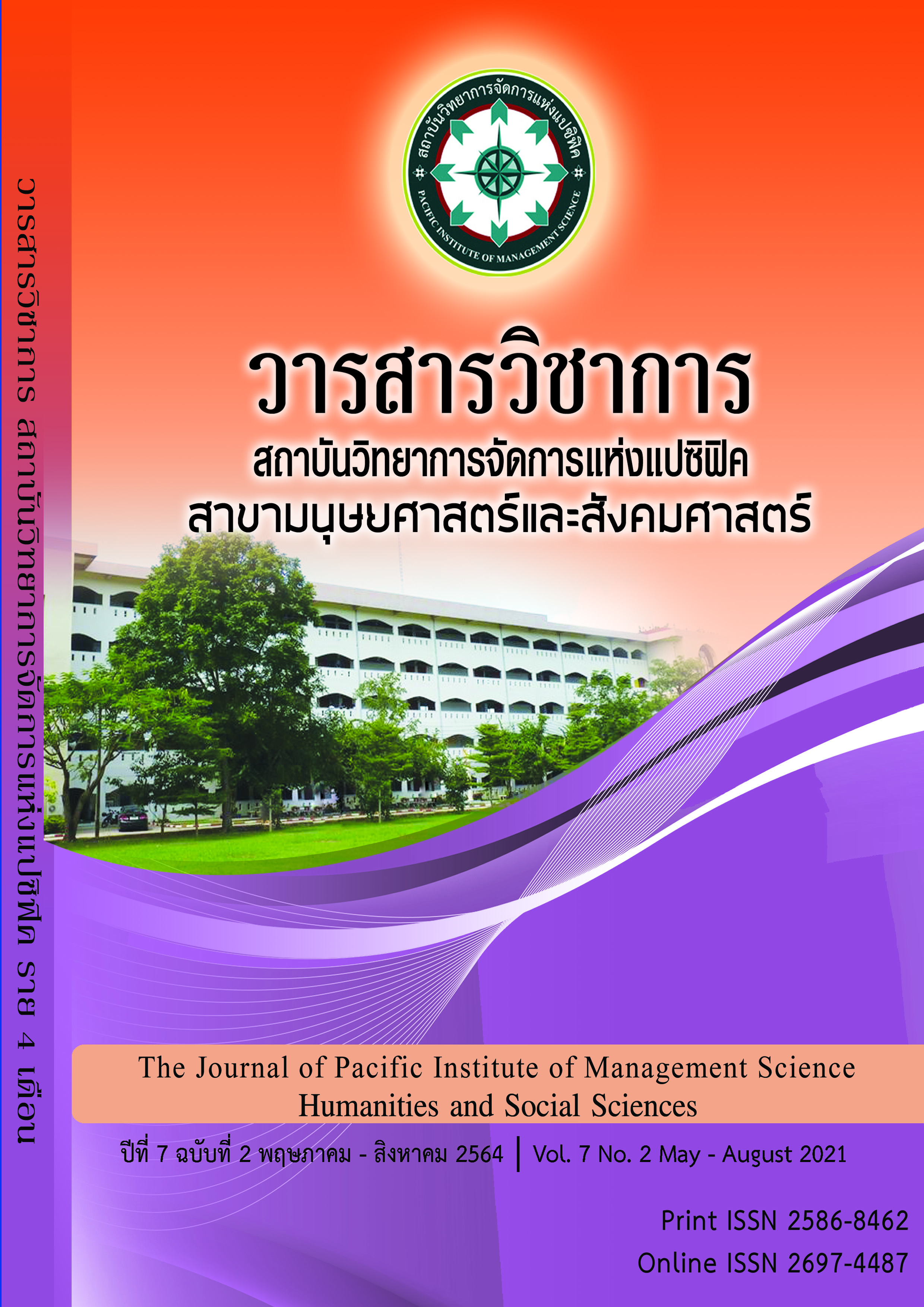Buddhism to enhance the quality of life in the community Kham Phee Subdistrict, Nakae District. Nakhon Phanom Province
Keywords:
Buddhism, quality of life, Dharma principlesAbstract
This research is made to study about the Guidelines for using Buddhism to enhance the quality of life and Study the suggestions for improving the quality of life by using Buddhism of the people in the community Kham Phee Subdistrict, Nakae District. Nakhon Phanom Province. Which is a research study in the form of document research and field research with indepth interview. The population in the research is people in community Kham Phee Subdistrict, Nakae District. Nakhon Phanom Province. Then analyzed and synthesized in the form of descriptive reports, analysis which the study found that people know and apply Buddhist principles for use as guidelines for enhancing the quality of life which has the way to use Buddhism to enhance the quality of life the most the guidelines for using the 5 precepts are followed by the 4 sublime states of mind , the use of the 4 virtues for a good household life and the 4 Noble Truths and there are suggestions for improving the quality of life by using Buddhism, 1) Accepting the truth about what is happening to the physical condition. Everyone's health must be like this. It's not just us that are. 2) Psychological and emotional When observing the precepts Listening to Dharma then becomes tolerant, reduces anger, greed, grows consciousness, listens to Dharma, helps society. Believe in the law of karma, do good, get good, do bad, get bad, don't be careless, let go. 3) Create good relationships in the family and society. Helps to be optimistic, understanding, sympathetic, and respecting one another. Can resolve problems and conflicts Know about giving generosity with each other helps to live happily together in society and 4) Can solve economic and income problems Do not underestimate the expense of property live a sufficient life reduce the costs associated with various vices.
References
ดุษฎี อายุวัฒน์. (2558). การสร้างทางเลือกในการพึ่งพาตนเองอย่างมีความสุขของผู้สูงอายุรุ่นใหม่.
วารสารประชากรและสังคม ปีที่ 4 ฉบับที่ 2, 23-45.
ปาริชาดิ สุวรรณบุบผา และคณะ,(2562). พระพุทธศาสนากับการเสริมสร้างพลังในการดำรงชีวิตและทัศนคติที่เหมาะสมของคนพิการกรณีคนพิการในเขตกรุงเทพมหานครและปริมณฑล สืบค้นที่ http://kb.hsri.or.th/dspace/handle/11228/2273?locale-attribute=th วันที่ 26 ตุลาคม 2562
พระเทพเวที (ประยุทธ์ ปยุตโต), (2534), ธรรมนูญชีวิต, กรุงเทพมหานคร : กรมการศาสนา.
พระธรรมปิฎก (ป.อ. ปยุตฺโต), (2543), พุทธธรรม, กรุงเทพมหานคร : มหาจุฬาลงกรณราชวิทยาลัย.
พจนานุกรม ฉบับราชบัณฑิตยสถาน พ.ศ. 2542. (2546). กรุงเทพมหานคร: นานมีบุคส์พับลิเคชั่น.
มหาจุฬาลงกรณราชวิทยาลัย. พระไตรปิฎกภาษาบาลี ฉบับมหาจุฬาเตปิฎกํ 2500.กรุงเทพมหานคร : โรงพิมพ์มหาจุฬาลงกรณราชวิทยาลัย, 2535.
มหาจุฬาลงกรณราชวิทยาลัย. (2539).พระไตรปิฎกภาษาไทย ฉบับมหาจุฬาลงกรณราชวิทยาลัย.กรุงเทพมหานคร : โรงพิมพ์มหาจุฬาลงกรณราชวิทยาลัย, (45 เล่ม)
ยุวัฒน์ วุฒิเมธี. (2534). หลักการพัฒนาชุมชนและการพัฒนาชนบท. กรุงเทพมหานคร : ไทยอนุเคราะห์ไทย.
สัญญา สัญญาวิวัฒน์. (2546). ทฤษฎีและกลยุทธ์การพัฒนาสังคม. พิมพ์ครั้งที่ 5. กรุงเทพฯ :
อนุชาติ พวงสำลีและอรทัย อาจอ่ำ. (2539). การพัฒนาเครื่องชี้วัดคุณภาพชีวิตและสังคมไทย. กรุงเทพมหานคร : สำนักงานกองทุนสนับสนุนการวิจัย.
Ferrans, C.E. (1990). “Development of a Quality of Life Index for Patients With Cancer,” Oncorogy Nursing Forum. : 15 – 21.
Flanagan.J.C. (1998). A research approach to improving our quality of life. American Psychologist, 3. 138 -147.
Liu, B. C. (1975). Quality of life: Concept, measure and result. The American Journal of Economic and Sociology, 34, 12.
The WHOQOL Group.(1996). What quality of life. World Health Forum,17,354-356.
World Health Organization. Expert Committee. Health of the elderly. WHO Technical Report Series, No 779 (1996): 1 - 98.
Downloads
Published
Issue
Section
License
Copyright (c) 2021 Pacific Institute of Management Science

This work is licensed under a Creative Commons Attribution-NonCommercial-NoDerivatives 4.0 International License.
บทความที่ได้รับการตีพิมพ์เป็นลิขสิทธิ์ของ สถาบันวิทยาการจัดการแห่งแปซิฟิค
ข้อความที่ปรากฏในบทความแต่ละเรื่องในวารสารวิชาการเล่มนี้เป็นความคิดเห็นส่วนตัวของผู้เขียนแต่ละท่านไม่เกี่ยวข้องกับสถาบันวิทยาการจัดการแห่งแปซิฟิค และคณาจารย์ท่านอื่นๆในสถาบันฯ แต่อย่างใด ความรับผิดชอบองค์ประกอบทั้งหมดของบทความแต่ละเรื่องเป็นของผู้เขียนแต่ละท่าน หากมีความผิดพลาดใดๆ ผู้เขียนแต่ละท่านจะรับผิดชอบบทความของตนเองแต่ผู้เดียว







